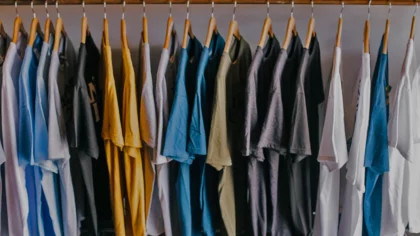Accelerate Productivity in 2025
Reignite Growth Despite the Global Slowdown
Fashion is one of the top money-making industries globally. To help fashion companies stay on top of the industry and keep their customers engaged, startups are advancing new technology trends. They increase revenue, push design limits, and enable data-driven strategic decisions. In this report, we provide an overview of top global fashion technology trends ranging from virtual fashion and data analytics to fashion live streaming. Read more to explore the top tech-driven trends transforming the fashion industry.
Innovation Map outlines the Top 8 Fashion Technology Trends & 16 Promising Startups
For this in-depth research on the Top Fashion Technology Trends & Startups, we analyzed a sample of 1 423 global startups and scaleups. The result of this research is data-driven innovation intelligence that improves strategic decision-making by giving you an overview of emerging technologies & startups in the fashion tech industry. These insights are derived by working with our Big Data & Artificial Intelligence-powered StartUs Insights Discovery Platform, covering 2 500 000+ startups & scaleups globally. As the world’s largest resource for data on emerging companies, the SaaS platform enables you to identify relevant startups, emerging technologies & future industry trends quickly & exhaustively.
In the Innovation Map below, you get an overview of the Top 8 Fashion Technology Trends & Innovations that impact fashion companies worldwide. Moreover, the Fashion Innovation Map reveals 1 423 hand-picked startups, all working on emerging technologies that advance their field.
Top 8 Fashion Technology Trends
- Virtual Fashion
- Blockchain
- Artificial Intelligence
- Sustainable Fashion
- Smart Clothing
- Hyper-personalization
- Big Data & Analytics
- Fashion Live Streaming
Tree Map reveals the Impact of the Top 8 Fashion Technology Trends
Based on the Fashion Tech Innovation Map, the Treemap below illustrates the impact of the Top 8 Fashion trends in 2023. Virtual fashion solutions use immersive technologies, such as augmented and virtual reality (AR/VR), whereas fashion live streaming boosts customer engagement. Blockchain solutions secure fashion assets and provide digital transaction transparency. AI, data analytics, and big data aids fashion production by forecasting upcoming trends and defining the needs of the target audience. While sustainable fashion reduces the harmful impact on the nature of the fashion industry, the Internet of Things (IoT) and 3D printing are advancing smart clothing and hyper-personalization.
Global Startup Heat Map covers 1 423 Fashion Technology Startups & Scaleups
The Global Startup Heat Map below highlights the global distribution of the 1 400+ exemplary startups & scaleups that we analyzed for this research. Created through the StartUs Insights Discovery Platform, the Heat Map reveals that Europe and the US see the most startup activity.
Below, you get to meet 16 out of these 1 423 promising startups & scaleups as well as the solutions they develop. These fashion tech startups are hand-picked based on criteria such as founding year, location, funding raised, and more. Depending on your specific needs, your top picks might look entirely different.
Top 8 Fashion Technology Trends for 2023
1. Virtual Fashion
Technology is bringing the fashion industry from physical to digital space. Virtual fashion solutions overcome physical constraints through AR or VR and provide unlimited creative space. These technologies allow customers to try clothing or make-up virtually before buying them. 3D technologies capture the shape of the human body to create 3D models for internet shopping and clothing design. Additionally, smart fashion equipment such as smart mirrors combines voice and facial recognition. It enhances fashion and retail sales, providing customers with shopping tips and outfit suggestions as well as enabling virtual try-on experiences.
Veesual AI creates Virtual Try-on Experiences
French startup Veesual AI provides virtual try-on experiences for fashion and eCommerce industries. The technology uses generative AI to combine images of clothing and people with photorealistic results. After choosing a model with which the buyer identifies with, the system provides an interactive lookbook. The solution also offers an engaging product discovery feature, reduces the time spent on the outfits photoshoot, and allows collection personalization.
Spree3D offers Virtual Avatars
US-based startup Spree3D creates Dubbles, virtual avatars for the fashion metaverse. It creates photorealistic and animated avatars that can instantly wear digital fashion within video experiences. They automate the fashion experience for engagement between brands, creators, and customers. Moreover, the avatars make the industry more sustainable by avoiding the wastage of clothes during shoots.
2. Blockchain
With increasing digitization, data security and transparency is a top priority. Blockchain-based solutions ensure authenticity for both digital goods and real fashion goods. Traceability systems and product digital passports improve supply chain traceability by checking transactions and preventing imitation. Another blockchain-based technology is non-fungible tokens (NFTs) which provide proof of ownership over an asset. Fashion brands and designers are also releasing NFTs for the fashion metaverse.
Retraced aids Fashion Traceability
German startup Retraced provides blockchain-enabled supply chain tracing and verification. The startup’s fashion traceability system streamlines supply chain tracking and provides transparent data to authenticate and share product and material origin with customers. This bottom-up tracing enables deep internal tracing and digital communication throughout all stages of production. Moreover, it increases transparency, especially from upstream suppliers, resulting in a more sustainable fashion value chain.
The Dematerialised builds a Digital Fashion NFT Marketplace
UK-based startup The Dematerialised provides a digital fashion NFT marketplace. It hosts virtual experiences that generate additional revenue for fashion creators and consumers. The startup’s virtual items exist as non-fungible tokens (NFTs). This allows virtual goods to have unique identifiers, enabling a fully transparent product journey visible to all users.
3. Artificial Intelligence
Fashion brands are reinventing their approach to product design and development by integrating AI. It forecasts fashion trends to help fashion companies stay flexible in response to changing customer demands. Making AI a part of the shopping experience allows brands to ensure that customers get a personalized experience. Moreover, AI automates wardrobe planning by offering personalized shopping recommendations based on past purchases. The use of AI-generated media, also known as synthetic media, is accelerating creative solutions for fashion brands that better address market demand and improve their relationships with customers.
T-Fashion provides Fashion Trend Forecasting
Turkish startup T-Fashion develops a fashion trend forecasting platform. The AI-powered platform captures trend dynamics through online interactions of target audiences. It minimizes overstock products and waste by providing information on customer needs and preferences. This enables data-driven strategic decision-making for fashion brands.
KKAADA creates an AI Fashion Stylist
Israeli startup KKAADA develops an AI fashion stylist that recommends clothing purchases based on the look and personal tastes of users. In addition, the startup provides virtual styling using clothes that the user has in the wardrobe. It generates outfits by combining the range of online stores and the user’s clothes. This way, the solution improves the utilization of purchased clothes.
4. Sustainable Fashion
Aiming to achieve a carbon-neutral fashion industry, startups are developing circular fashion solutions. Such solutions produce clothes from recycled materials and eco-fabrics, offering brands and customers an alternative to harmful fast-production products. Another way is to repurpose post-consumer waste or worn-out pieces of textiles into new items. Further, the use of linen, hemp, and recycled fibers reduces water consumption. Other materials such as vegan leather and other engineered materials also offer sustainable alternatives to conventional fabrics.
Sojo enables Circular Fashion
UK-based startup Sojo develops a delivery-style app for clothing alterations and repairs. The startup connects customers to local seamster businesses through the app and bicycle delivery service. This promotes circular fashion, enabling customers to reduce clothes returns and carbon footprint.
Hamsa Recycling produces Sustainable Shoes
Azerbaijani social startup Hamsa Recycling uses recycled materials such as textile and plastic waste to produce shoes and clothing using 3D scanning and augmented reality. The startup creates products for the spring-summer season from old jeans and upcycles plastic waste for the autumn-winter season. The solution reduces pollution and supports a circular economy by utilizing textile waste in clothing production.
5. Smart Clothing
To meet the need for adaptable clothes, startups are launching smart clothes. They collect, store, and exchange wearer’s biometric and physical data. This enables applications for health and fitness as well as improves performance. IoT is also advancing the development of smart clothing. Additionally, smart clothing improves worker safety, such as by regulating the temperature to the user’s needs in an unstable environment.
Beston manufactures Connected Customizable Clothes
Spanish startup Beston produces connected customizable clothes that adjust temperature levels according to customer preferences. The startup’s coat design features a battery to charge a mobile phone or any other device while providing heat to the owner Moreover, it includes a personalized QR with professional, social, and emergency information. Further, the startup uses recycled and vegan materials, making its clothes sustainable.
IcosaMed makes a Smart Bra
Swiss startup IcosaMed manufactures a smart bra for early-stage breast cancer detection and monitoring. It features embedded miniaturized echographic transducers that send ultrasounds from multiple sources. This technology creates a 3D picture of the organ or tissue using sound reflections from the cells’ density variation. This way, the startup’s solution provides a smart wearable fashion that aids women tackle breast cancer.
6. Hyper-Personalization
Fashion brands are increasingly turning to personalization to create novel designs and offer custom options. Additive manufacturing allows companies to adapt to consumer needs and develop sustainable and eco-friendly solutions for the fashion industry. Moreover, it enables demand-driven production to prevent overproduction. Startups are also developing fashion gaming solutions to enhance personalization, increase younger consumers’ engagement, and provide shoppable virtual fashion assets and physical clothes.
Speetra creates 3D-printed Clothes
French startup Speetra builds a platform for the design of 3D-printed clothes. After uploading 2D sketches to the platform, the algorithm translates them into 3D designs which are then 3D-printed. The solution allows designers and brands to transform their physical processes into digital ones. This enables hyper-personalization as well as offers a greener solution.
HILOS offers On-demand 3D-printed Shoes
US-based startup HILOS provides on-demand 3D-printed shoes. Its manufacturing process utilizes proprietary shoe molds adapted for digital production and an ultra-synthetic material. This results in a soft, resilient insole with a flexible platform that supports every step. The startup’s solution can be repurposed for new products at the end of life, thereby reducing material waste. Moreover, the digital production process eliminates the risk of overproduction or underproduction.
7. Big Data & Analytics
Big data and analytics enable brands to leverage data to create new designs and plan fashion collections. It also allows brands to take data-driven decisions that simplify inventory management and collection planning. Fashion brands and retailers are using data analytics to improve product offerings and communication with the target audience. By enabling precise personalization, it increases sales and profitability. In addition, the technology predicts production hazards and identifies damaged goods for future repairs.
Fashion Data develops a Fashion Data Platform
French startup Fashion Data builds a fashion data platform for providing smart data for zero-waste fashion businesses. It uses big data and AI to enable secure decision-making, detect personal data for anonymization, and analyze fashion data. Further, the platform provides customer insights, predicts demand forecasts, and guarantees product availability.
Made2Flow provides Fashion Impact Measurement
German startup Made2Flow offers impact measurement solutions for the fashion industry. The startup provides environmental measurement across the fashion supply chain, enabling transparent carbon budget management for all stakeholders. The solution identifies impact hotspots, increases traceability, and accelerates impact by mapping the harmful footprint across the supply chain. This enables brands to understand the impact of their decisions and reduce emissions.
8. Fashion Live Streaming
With the rise of digitalization, consumers are spending more time on digital media. This is why fashion brands are using live streaming to offer digital content to their target audiences. The live shopping trend combines the benefits of social media and at-home shopping. It provides consumers with an immersive and interactive experience as well as fosters a sense of community with their customers. Technologies such as 5G are improving the quality of live streaming and promoting more interactive content and convenient eCommerce features.
The Pro Box enables Interactive Fashion Streaming
UK-based startup The Pro Box creates interactive beauty and fashion streaming television for beauty, fashion, and wellness brands and their target audience. Users get access to a library of interactive multi-disciplinary guides on skin and hair types and beauty courses to help them find the best products. In addition, The Pro Box members receive exclusive brand discounts, access to virtual and live events, and limited product releases. This allows brands to connect with their target audiences as well as entertain and educate the community on fashion topics.
PROTO creates Holographic Displays
US-based startup PROTO develops holograms that can be used in the fashion industry. Its full-scale holographic displays present digital collections at fashion shows. This provides a new way to browse and purchase products and allows people to meet and communicate with their idols. Additionally, with the startup’s companion app, users can personalize the network/streaming experience with live/prerecorded interactive content.
Discover all Fashion Technology Trends, Technologies & Startups
The fashion tech industry is constantly evolving with new technology trends. A host of innovations show how technology automates, personalizes, and accelerates the fashion space. Think of robots that sew and cut fabric, AI algorithms that predict style trends, or virtual clothes. The industry continues to adapt to the needs of consumers with a growing focus on inclusivity and personalization. Further, startups are increasing fashion supply chain sustainability and enabling circular economy solutions.
The Fashion Technology Trends & Startups outlined in this report only scratch the surface of trends that we identified during our data-driven innovation and startup scouting process. Among others, circular fashion, wearables, and traceability will transform the sector as we know it today. Identifying new opportunities and emerging technologies to implement into your business goes a long way in gaining a competitive advantage. Get in touch to easily and exhaustively scout startups, technologies & trends that matter to you!
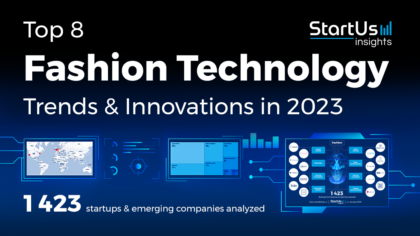
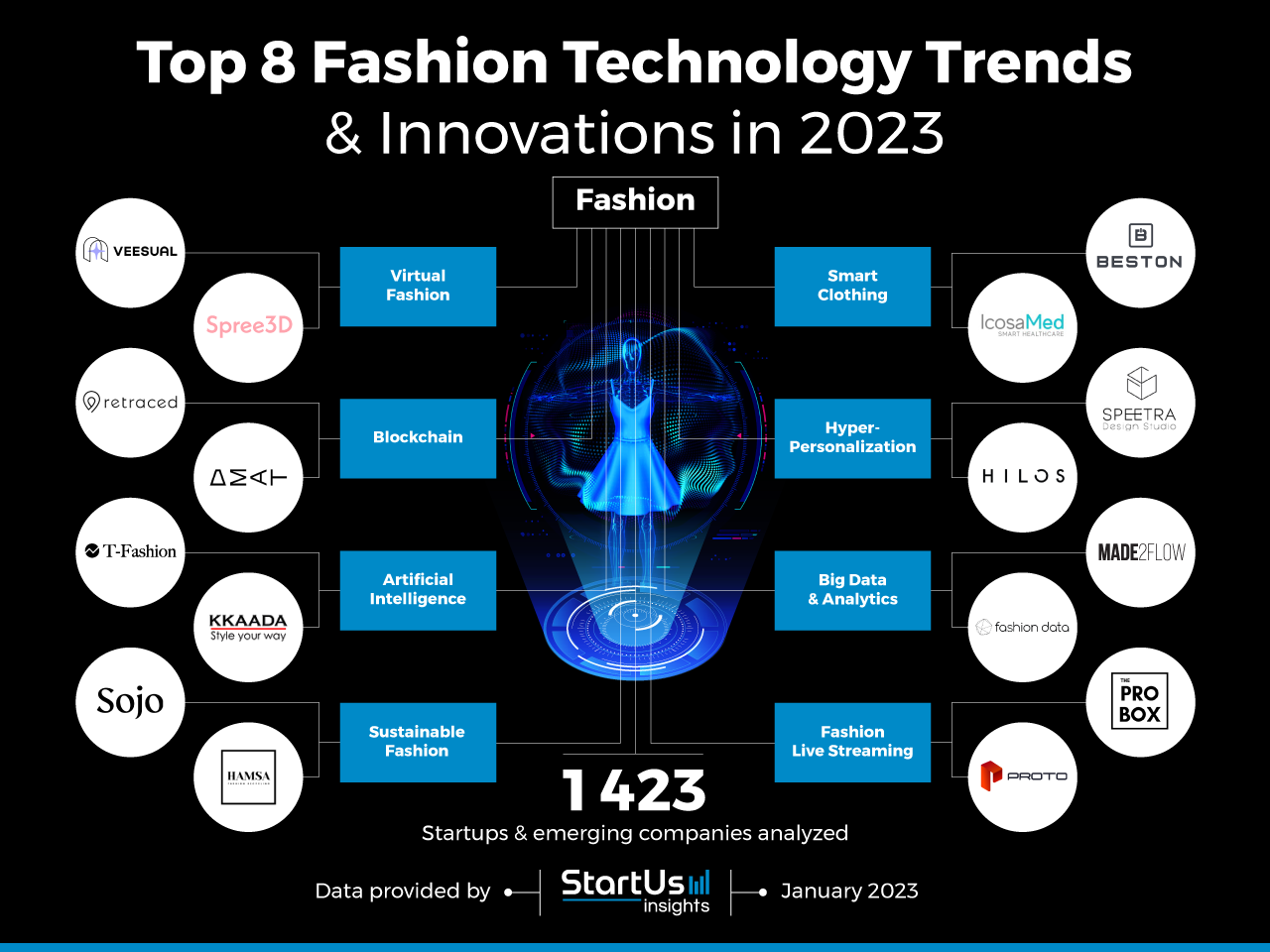
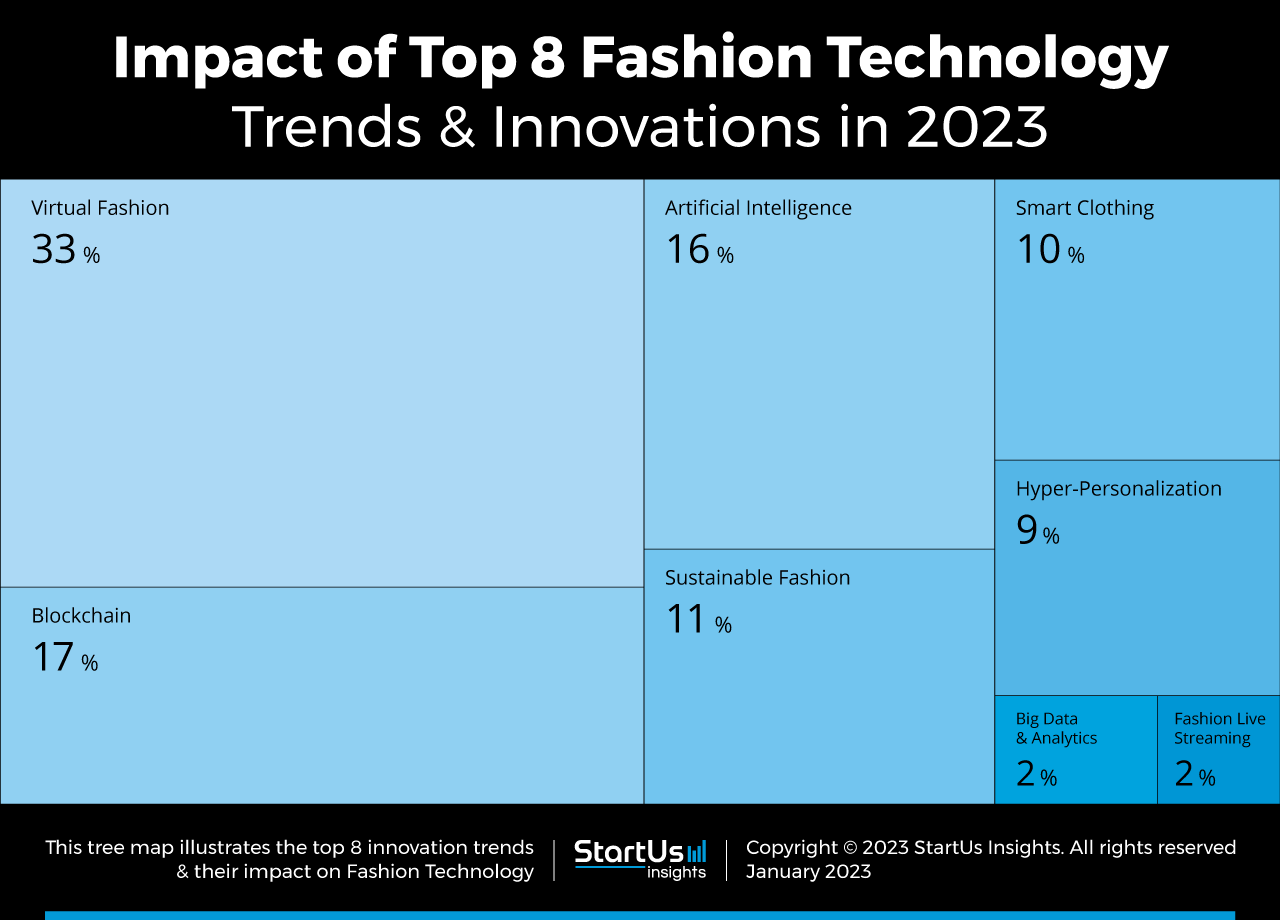
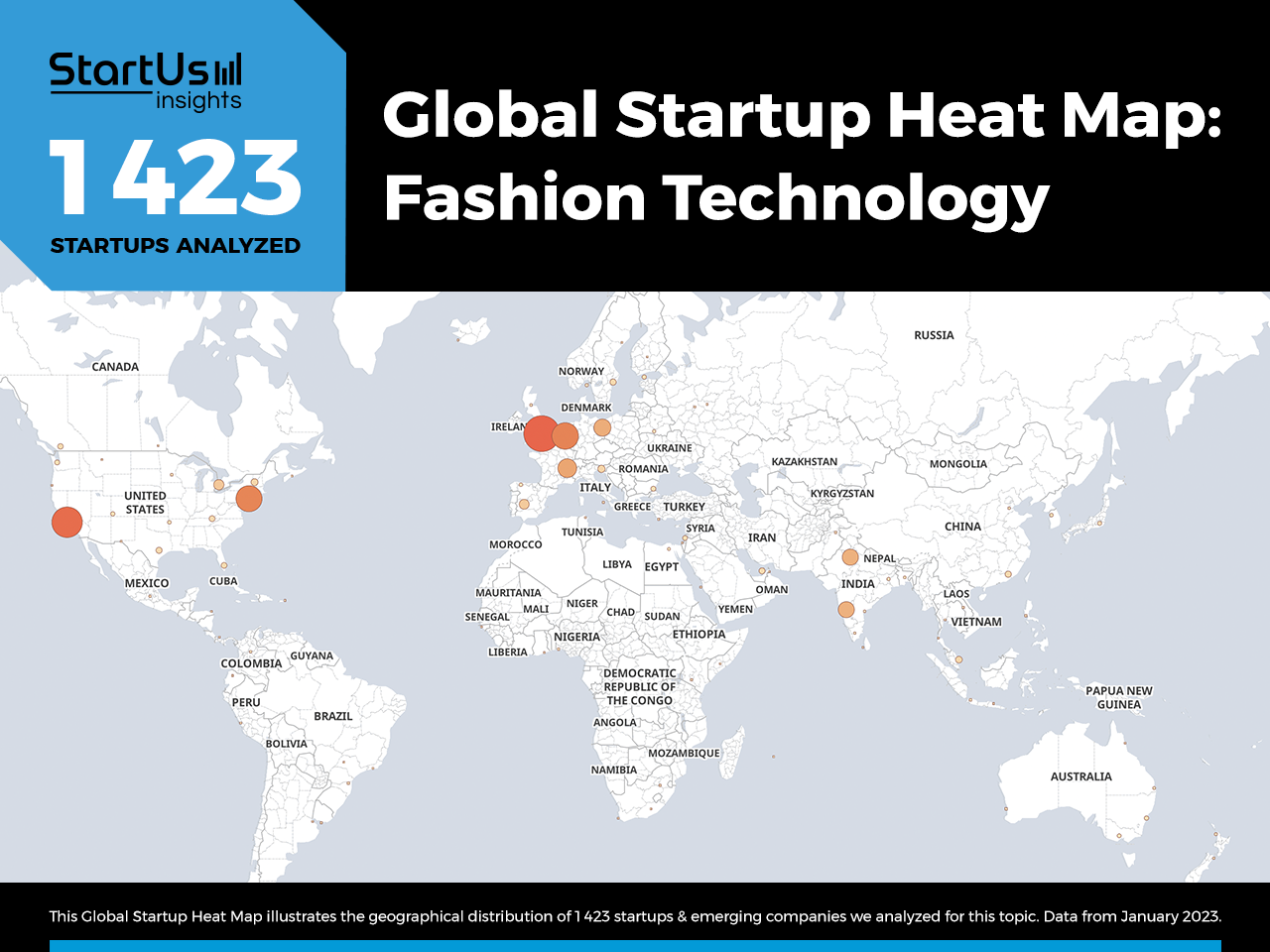
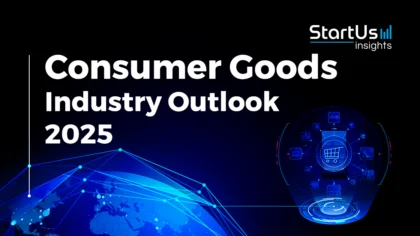
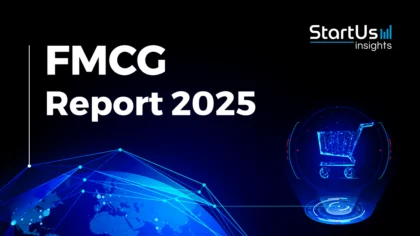
![AI in Retail: A Strategic Guide for Industry Leaders [2025-2030]](https://www.startus-insights.com/wp-content/uploads/2025/04/AI-in-Retail-SharedImg-StartUs-Insights-noresize-420x236.webp)
